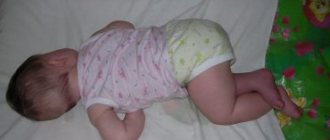The baby does not sleep in the crib, only in his arms? There are many reasons for this way of falling asleep. Let's look deeper into the problem. The appearance of a tiny family member, a small copy, is perceived by parents as unearthly happiness. The mother does not leave her newborn one step, she is afraid to leave him alone. Babies instantly get used to constant tactile contact with their mother, and they feel safe and protected. An inextricable bond is formed, the baby’s constant need for maternal affection. In addition to the advantages, this phenomenon has disadvantages.
The newborn does not want to be left alone in the crib. Reluctance is expressed in any convenient way. The baby is capricious, cries, and resists being moved to the crib. Parents are nervous, irritated, and don’t know what to do or how to behave.
Why does a baby fall asleep sweetly, sleep soundly and serenely only when receiving maternal affection and tactile contact? Is this a normal option? Should I worry about breaking the habit? Let's consider a similar phenomenon in the article.
Signs of restless sleep
A newborn needs to sleep a lot and eat well. Newborns dream more than 18 times a day. The process of hibernation occurs in different ways.
Babies can instantly go into hibernation while still breastfeeding. In some cases, babies have to be rocked, lulled, and sung songs until they “pass out.”
Long laying sessions become difficult and exhausting for adults. The baby does not sleep for a long time at night and has difficulty falling asleep during daylight hours.
Dream disturbance has distinctive features:
- The baby cannot go to sleep on his own. Parents are forced to form bedtime rituals - rocking, rocking;
- Babies instantly fall asleep in the arms of mom and dad. Transferring to your own sleeping place is accompanied by awakening and whims;
- the baby falls asleep, but, sensing the absence of his mother, he immediately wakes up, cries, calling her.
Mothers of babies who have a strong habit of falling asleep in their arms have to sleep sitting up. A woman cannot fully rest because she is afraid of dropping her beloved child and causing injury. The parent is constantly tense, physically and emotionally exhausted.
To eliminate the need for tactile contact to fall asleep, determine the cause of the need. Experts highlight the most common reasons.
Is motion sickness necessary?
Many experts do not recommend rocking a baby to sleep due to the negative impact on the development of the vestibular system. The uniform movement has a hypnotic effect, the baby falls asleep faster. Rocking in your arms often becomes a habit and a reason for refusing to fall asleep in the crib. The alternative in the form of a cradle also creates addiction. If you stop rocking a sleeping baby, he may wake up. Parents are forced to spend time and effort, and later nerves, trying to wean their baby from this habit.
Why does a child sleep in his arms?
The main, common reason for developing the habit of sleeping in your arms is the desire to feel maternal warmth, care, and affection. Birth is stressful for a small organism. The baby is frightened by unfamiliar surroundings, sounds, and objects around.
A change in the environment at birth causes fear and fright in both the newborn and the baby of three or four months. Relaxation and calm occurs with tactile contact with the mother, with the sound of her voice, with the feeling of breathing.
The role of close contact between the baby and mother in the formation of personality in the future has been scientifically proven. The little ones who were inextricably linked with her grow up self-sufficient, purposeful, and self-confident. From an early age they appreciate human warmth and learn to trust.
The peculiarity of newborns is that when the eyes are closed, the surrounding space ceases to be perceived by the children. Together with the environment, the closest, most valuable person for the baby disappears. This sensation causes discomfort.
Psychological research has revealed some patterns that alarm parents:
- the baby goes into hibernation, the surrounding space disappears, discomfort and fear appear, it feels the familiar maternal aroma, warmth, and unpleasant sensations are eliminated;
- the baby is sleeping in the crib, the mother is nearby, the little person unconsciously suppresses the desire to sleep so as not to be left alone, the eyes are closed, there is no feeling of maternal warmth, the child is scared and screams.
In addition to the reasons formed at the subconscious level, the baby seeks relief, salvation from colds, intestinal colic, and pain when teeth appear. Overwork, fatigue, colds increase the desire to climb into your own arms and stay there longer.
Reasons for "manual sleep"
During childbirth, the baby experiences severe stress, finds itself in an aggressive environment and is forced to adapt to difficulties. He calms down faster in his arms and falls asleep soundly and for a long time. The smell, warmth, mother's voice and her heartbeat remind the newborn of the intrauterine environment and are associated with safety. Tactile contact is a natural need and helps strengthen the psychological connection.
The mother's closeness builds trust in the world around her and has a beneficial effect on the nervous system and overall development of the baby. It grows better and has strong immunity. Touches help the baby feel significance and love from family. Psychologists recommend spending more time with your baby until he reaches six months.
It is important to understand why the baby sleeps only in his mother’s arms. The main reason is anxiety caused by various factors:
- Overexcitation – due to increased activity or characteristics of the nervous system;
- A tense situation in the family, quarrels - an infant subtly senses negativity;
- Discomfort due to uncomfortable clothing, cold or heat in the room;
- Extraneous sounds, bright light;
- Change of scenery, visiting relatives, travel.
Being close to the mother helps to calm down faster during pain, teething, and makes the newborn feel better during colic and bloating.
Wrong and right actions of parents
Many people advise staying calm and not giving in to the whims of children. Children should sleep in a designated place. To form the habit of resting in the crib, put him to bed, leave the room, and do not react to whims or a child’s cry.
This behavior is not always appropriate. Newborns in the first months of life are connected by an invisible thread to their mother. Babies need psychological and emotional contact with their mother. At this age, children do not understand that the parent leaving the room is nearby.
The feeling that the baby is alone in the room causes fear. Children of older age categories - 2-3 years old, having lost a parent on the street, in a noisy store, panic and start screaming. The disappearance of a coveted object from a tiny person’s field of vision is very stressful.
Some parents tend to panic. Hearing a child's crying and screams, they rush to the crib, grab the baby, rock it, cradle it, trying to stop the hysteria.
This tactic is unacceptable. If a child cries, this is not a sign of negative emotions, pain, hunger, or discomfort. With the help of screams, the baby communicates with the outside world.
Attentive, caring parents personally capture the timbre, tone, and motive of a child’s crying. Some children call on adults for help in emergencies. Others tend to get what they want in this way.
How to behave correctly, how to act if the baby goes into hibernation only in a warm embrace? Consider individual characteristics:
- If there are loud screams or continuous crying, talk to the baby, sing a song, and carefully pick him up. Such activities will have a calming effect;
- if the baby wakes up when you try to move him to his bed, talk to him, read fairy tales, sing songs. Make them feel like you are nearby.
Child psychologists give a number of useful tips to relatives of restless children.
Common Mistakes
Falling asleep in a child's arms leads to a lack of time and a decrease in the quality of the mother's sleep. As the baby's weight increases, the load on the adult's joints and spine increases. This leads parents to extremes.
Negative
Dissatisfaction, anger at the child or the current situation. Negative emotions are transmitted to the baby, aggravating his condition. An adult must be able to cope with bad moods and look at things positively. The psychological and physical health of the baby depends on this.
Sudden change in parenting tactics
Abrupt weaning from hands deprives the child of the necessary affection and is a great stress. You need to act gradually, select alternative ways of laying down, and at first stay close to the crib.
Loneliness
Leaving a screaming child alone for a long time. The technique was proposed by the American pediatrician Benjamin Spock, who admitted his mistake. The baby actually cries less and less and gradually gets used to falling asleep on his own. At the same time, he experiences a lot of stress, causing nervous disorders in the future. The healthy formation of a psycho-emotional connection with the mother is disrupted.
Co-sleeping
Co-sleeping – suitable for newborns and premature babies. This can be dangerous for the baby and requires sensitivity from adults. If co-sleeping becomes a habit, parents will face the baby's fear of sleeping separately. This will take time to unlearn and will become new stress.
Many parents pick up their baby if he makes sounds while he is sleeping. It’s better to wait a couple of minutes, the baby can calm down on his own. If the crying intensifies, then there is a good reason: discomfort, pain or hunger, they need to be eliminated.
Weaning your baby from sleeping in your arms requires patience, but is an important stage in the development of independence. It may take several days, but the effort will be rewarded with a restful baby's sleep and will allow parents to fully rest. In case of difficulties, you should consult your pediatrician on how to wean your child off your hands.
How to stop a child from falling asleep in your arms?
What is the right thing to do in such a situation? Will you have to sleep sitting up, give up rest, the basic need to take a warm bath, have lunch sitting at the table, in order to constantly rock the baby? This is a real test, given that the little one is growing and gaining weight.
In order for the baby to fall asleep peacefully, ensure that the need for communication and contact with the mother during the daytime is met in accessible ways.
Experienced specialists and parents share tips in effective ways:
- When the baby is awake during the day, use a sling. This will help relieve your back, spine, and free your hands.
- An effective event is a joint vacation. Child psychologists advise placing a crib next to an adult. This way, the baby will fall asleep faster, feeling safe, and the quality of sleep will be better.
- Infants are swaddled before going to bed. Fixed arms and legs pressed tightly to the body give the feeling of being in the womb. The child goes into hibernation faster, sleeps more soundly, and wakes up less often.
- If during the night's rest children often wake up, are capricious, scream, or do not want to sleep, make adjustments to the daily routine. Try to shorten and cancel the day's rest temporarily. The baby will settle down faster in the evening. Do not overload your baby emotionally or physically during the day.
Buy a comfortable crib made from natural materials. Pay attention to bedding and sleepwear sets. To quickly get used to it and adapt to sleeping in a new place, put your thing there. A familiar smell will help you fall asleep faster and sleep more soundly.
To help your baby learn to settle down on his own, teach him not to be afraid of the dark. Curtain the windows during the daytime rest. The baby will develop a relationship between darkness and sleep.
Rocking and rocking should not be used at any opportunity. Babies instantly get used to them and stop falling asleep without such rituals.
Recommendations from psychologists
When babies at 3, 5, 7 months do not want to go to sleep on their own, when moving to the crib they scream, cry, and applying advice does not bring results, contact a child psychologist.
Are you afraid of children's screams, tears, and don't know how to avoid them when going to bed? Measures developed by specialists will help achieve the desired effect.
Child psychologists and specialists who develop and implement methods recommend:
- Do not ignore your baby’s requests for affection, tenderness, and love. Maternal affection and tenderness are required for full, harmonious development and personality formation.
- Satisfy children's curiosity, develop skills and interest in learning new subjects. Attention will switch to other objects, the baby will not be fixated on maternal attention.
- Express your feelings and emotions using various techniques: massage, play with your toddler, hug, pat him on the head.
- Watch the baby. Learn to differentiate between screaming in order to get what you want and crying for objective reasons (hunger, wet diapers, fear, etc.).
- If the baby is sleeping, then suddenly wakes up and cries, you should not immediately run, grab him in your arms, and calm him down. Within 1-3 minutes he will calm down on his own.
- Maintain a set daily routine that allows your children to go to bed at the same time every day. Before going to bed, follow preparatory rituals: bathing, massage, reading books.
- Don't ignore walks in the fresh air. New positive emotions will help you fall asleep quickly, without whims.
When creating a daily routine, do not overdo it with emotional and physical stress. A tired, exhausted child will not be able to sleep peacefully and will be overexcited. Getting ready for bed is carried out in a calm environment that promotes a smooth descent into sleep.
How to transfer a baby to a crib?
Many children fall asleep in their parents' arms; when the child is moved to the crib, he wakes up, begins to cry, and becomes capricious. Sometimes, when moving from their arms to their sleeping place, babies wake up, look around, and study the adult and surrounding objects in detail.
Adults should know how to prepare infants for bed. Child psychologists and pediatricians have developed instructions to help parents.
Activities necessary for putting children to bed:
- Before rocking, place a diaper so that the baby’s body touches the fabric, not the adult.
- When the baby falls asleep, be there for 15 minutes. From the moment you fall asleep, the superficial phase of sleep begins, which after 15-25 minutes is replaced by deep, sound sleep.
- After making sure that the little man is sleeping soundly, place him in the crib along with the sheet so that in the crib he is placed on the fabric as on his mother’s arms.
Swaddle newborns before bed. While in parental embraces, children's motor activity is limited. The crib has a lot of space and movement is not limited. Newborns involuntarily move their arms and legs, preventing them from sleeping.









